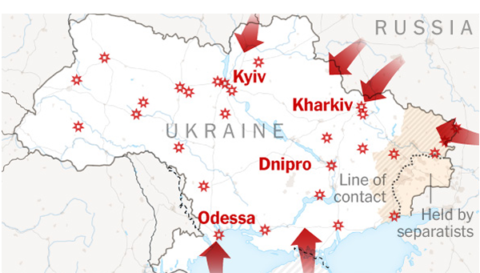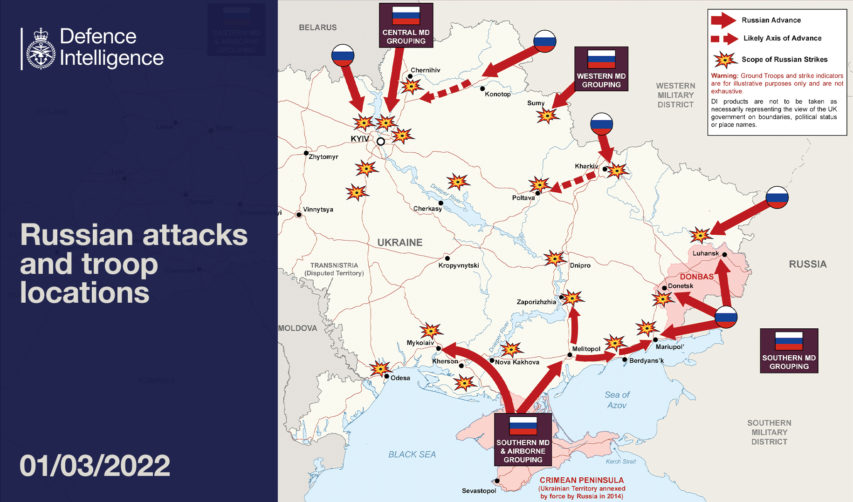In The Critic, Ben Sixsmith on the plight of Ukraine under Russian attack and the rather surprising success they have been having on western social media and in legacy media coverage:
Soon after the Russians invaded Ukraine, President Zelensky released a video to the world. Filmed on his mobile phone, it looked as if he could have been anyone else in the 21st century. He was tired and sad, and the skin was red around his eyes. Whatever a strong leader looks like, President Zelensky looked like the opposite.
That feels like a long time ago now. Somehow, the Ukrainians proceeded to launch the greatest PR operation of our times. How many people had heard of Zelensky, a veteran comic actor whose most significant action on the world stage since his electoral triumph in 2019 had been listening to Donald Trump’s ramblings, until a few days ago? How many people even knew there had been fighting in Donbass?
You have to wonder if the Russians, having seen the capitulation of the Afghan government, thought a Western ally would hightail it at the first opportunity. Zelensky, on the other hand, announced that he was staying in Kiev. His speech, addressed to the Russian people, was measured, dignified and eloquent. His little updates from the Kiev streets were mischievous and bold.
A weak country invaded by a powerful aggressor is naturally sympathetic. But the Ukrainian cause projected a uniquely irresistible combination of victimhood and strength. Theirs is not a tale of mere persecution but of underdog resolve.
What happened on Snake Island, for example, remains mysterious. The Ukrainians reported that their soldiers were killed after delivering a “go fuck yourself” to a Russian warship. The Russians claim they are alive. Still, the emerging image of unbreakable defiance, spreading across the vortex of social media, has won hearts and minds across the world.
What has been crucial is that people are not just pitying. They are inspired. We have heard relatively few tales of atrocities, because the Russians were attempting to minimise casualties, but also because the Ukrainians have attempted to maximise their triumphs. Did the “Ghost of Kiev” exist? Almost certainly not. But when such urban legends were combined with undeniably tough Ukrainian resistance in cities like Kharkiv, foreign sympathisers were encouraged to think that the Ukrainians, while embattled, had a fighting chance. This has been translated into sanctions on Russia and massive donations of arms and equipment.
David Warren reports that the Chinese government has accused the Ukrainians of trouble-making in Hong Kong:
This did not happen yesterday, I should explain, but some months ago. How did those clever Ukrainians do this, my reader may ask, naïvely. They did it by secular inspiration, when they uttered the phrase, “Slava Ukraini!” — which they had been doing in their own nationalist cause since the nineteenth century — and more aggressively since they fought for independence from the Leninist regime of the Soviet Union, during 1917–21.
Since 2014, the phrase has been in the air again, just as truck horns are in the air here in the Canadas. The Hong Kongois, who tend to be well-informed to a fault, picked up on it in 2019. They began to declare, “Glory to Hong Kong!” in multiple languages, from Cantonese to English; or rather, to sing it, for this phrase and its variants are often set to music, in both countries. (The Canadian trucker’s “Honk Honk” makes its own music.)
Wi Jinping, Vladimir Putin, and little Justin Trudeau, all get quite offended by the use of such phrases; and all have gone to the trouble of manufacturing bare-faced lies to resist the respective sovereignty movements. Readers will gather that I am unsympathetic with any of these dictators, or Mr Would-Be.
Because I (or more exactly, my father) was also unfavourably inclined to the dictatorship of Mr Adolf Hitler, it may be incumbent upon me to specify of what my disapproval consists. For granted, Hitler was a nationalist of a sort. I have long been an enemy of nationalism, when it is rudely proclaimed, though with mysterious moments of enthusiasm for nationalisms of other sorts.





